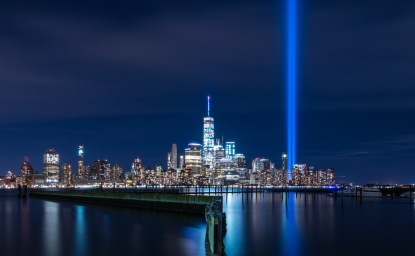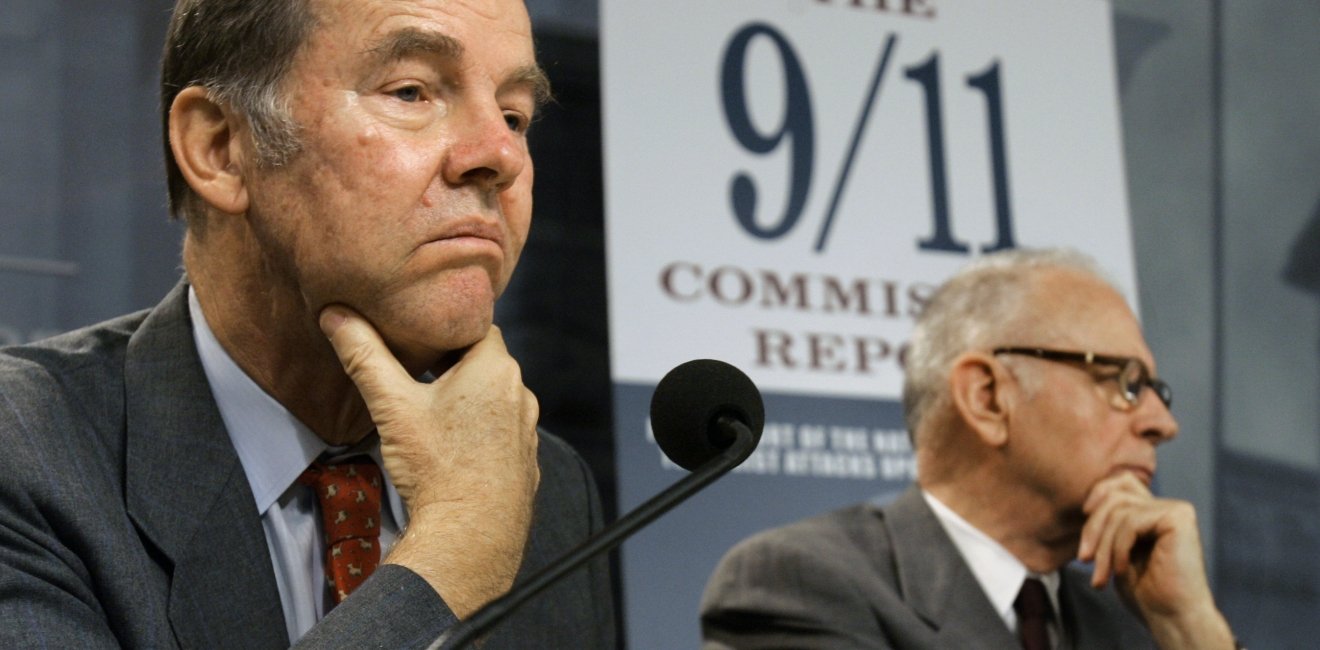
Date of Interview: August 16, 2021
This transcript has been edited for clarity.
JOHN MILEWSKI: When I was preparing to speak with you, I was surprised at how much emotion I was feeling just reliving the events of that day. It was my daughter's first day of preschool and so it's so vivid. We were driving her there to take pictures and I was listening to a radio station in New York and there was an eyewitness report from lower Manhattan, so immediately my news chaser instincts kicked in. I quickly took pictures and didn't even think about her safety at school because I just assumed it. I didn't know what was happening and began driving toward the office and that's when I saw the plume of smoke go up from the Pentagon. So I want to ask both of you the “where were you” question? What are your personal recollections of that moment on the morning of 9/11 when you realized that something more than a tragic airline accident had occurred.
GOVERNOR TOM KEAN: I was at home and I had dental surgery the afternoon before. I was getting ready to leave and the phone rang and it was my dentist. He said I’m just checking up on you to find out how you are and I said ‘I’m surviving in spite of you.’ He then told me to turn on the television because something's happening at the World Trade Center. He said he didn’t know what it is but it's something I should look at it. So I turned on the television and there it was. I was president of Drew University then so I worried immediately about the students. Many of them had parents or family at the World Trade Center. So I got in the car and drove to the university and no phones worked…we've forgotten that now, but in the whole area all the phone service was out. So I sent messages to the various residence halls for the kids to tell them to meet me in the center of campus. We talked about what was happening. So that's what I was doing.
CONGRESSMAN LEE HAMILTON: I was sitting on an airplane still parked at the gate getting ready to fly from Washington to Indiana and the flight attendant came through the cabin and said ‘get off the plane, get off the plane right away.’ I thought maybe a fire had broken out or something of that sort. I grabbed my bag from the overhead and went out and I had the same experience you had, John. I looked out the window as I was going from the airplane to the terminal and I saw a huge plume of smoke in the direction of the Pentagon. I couldn't see the Pentagon, I just saw the plume of smoke, but I knew where it was coming from so I knew we were in for a long day and a difficult day right then. I walked into the parking lot, got into my car, and couldn't move an inch in the traffic. It was just totally blocked and what ordinarily would take me 20 minutes to get from the airport to my home took me four and a half hours because of the traffic. Everybody was fleeing Washington and getting out and I’d never seen such a traffic jam in my life. Don't care to see one again. That's where I was.
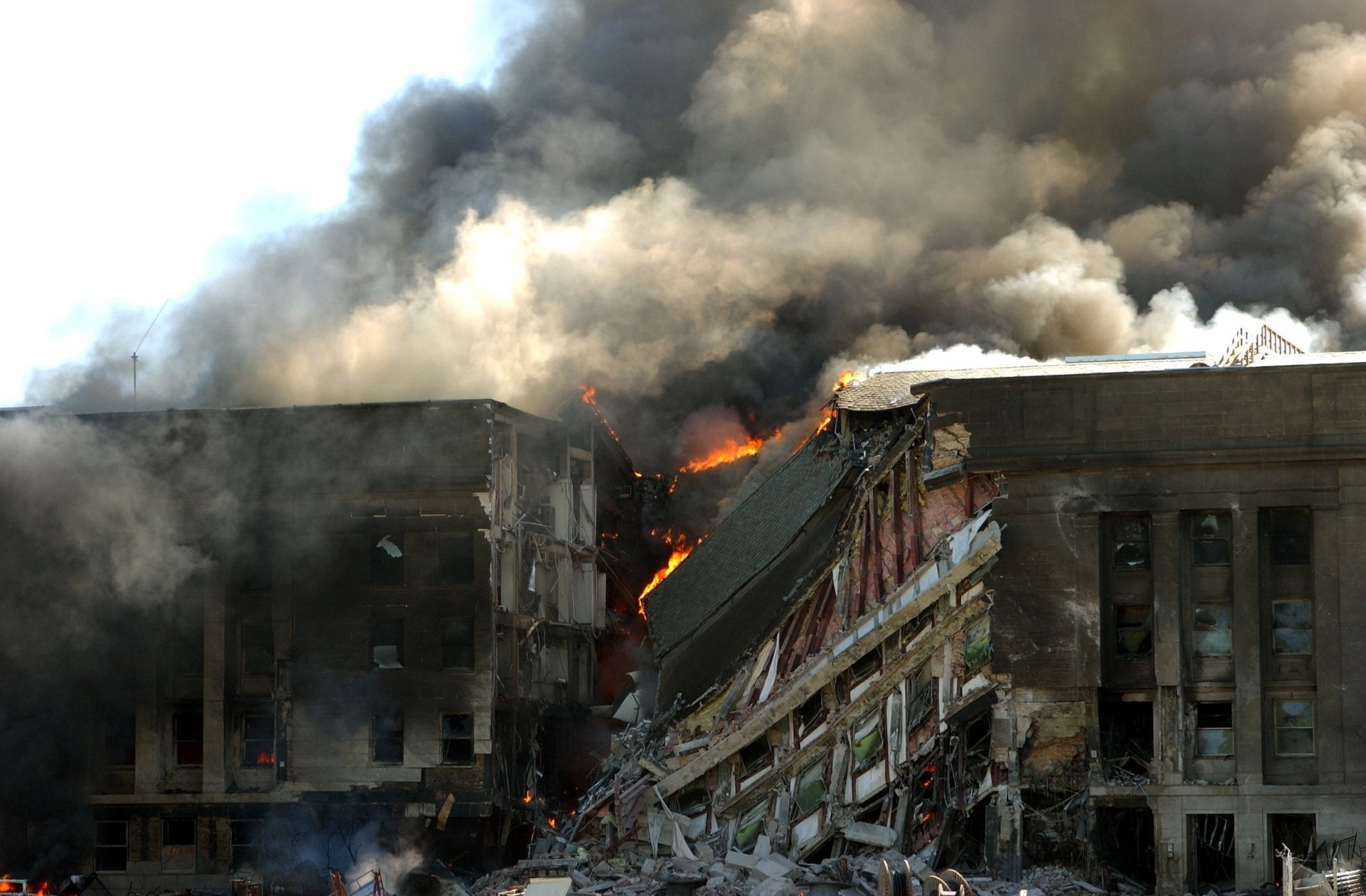
Thank you for sharing those personal experiences. Now I want to ask you about your official capacity as chairman and vice-chairman of the commission. I’m wondering about your initial reaction when asked to serve. Was it an assignment that you were ready to embrace immediately? Did you have reservations? Were there negotiations? How did you approach it? Governor Kean, let’s start with you.
KEAN: Well I was totally surprised by the whole thing. I had a call from Karl Rove at the White House, maybe a day before…saying we're looking at a great number of candidates to do this job now that Henry Kissinger has left and you're one of the names that surfaced…and if the President called you would you do it. I said, well I guess I would if the President called me. I didn't expect it to happen and thought that was the end of it. Within 24 hours, this time it was the President's chief of staff, and he said will you do it? And I said what? Actually, my mind was elsewhere. He said, take on that job, and I said really? He said yeah, and I said, well I guess so. He said the President was with his children and that he’d call me in the morning and talk about it. I said okay and I felt like a ton of bricks had fallen on me, and I started to think, what the hell do you do now?
I said okay and I felt like a ton of bricks had fallen on me, and I started to think, what the hell do you do now?
HAMILTON: Let's see, I had a call from Tom Daschle, who was then, I think, the majority leader in the Senate and this was before Kissinger had resigned. He asked if I’d be willing to serve with Henry Kissinger on this commission and I said yes of course and I called up Henry and talked to him about it. He made very clear that he was going to be the chairman and I was going to be very much a vice chairman, in his little way. But I accepted and told them I’d be glad to do it. Then he resigned and George Mitchell, who had been appointed by the Democrats, also resigned, both of whom had conflicting obligations. They then said they were thinking about Tom Kean as chairman. I said, well I do not know Governor Kean, I met him I think shaking his hands once or twice, but really didn't know him…and I said I know of him by reputation, which is superb of course, and I said I’d be glad to serve with Tom Kean.
Shortly thereafter Tom gave me a call and I’ll never forget that call because of what he said…and he said Lee, every decision we make we're going to make together.
He said I’m not going to make any decision by myself. That was a bit of a surprise to me because I came out of the Congress where the majority does everything first and turns it over to the minority only when they're through. But Tom not only said that, he followed through on it.
He said I’m not going to make any decision by myself. That was a bit of a surprise to me because I came out of the Congress where the majority does everything first and turns it over to the minority only when they're through. But Tom not only said that, he followed through on it. For example, if Tim Russert would call asking one of us to appear on Meet the Press, that kind of thing, in each case Tom and I would say we'll be glad to come but you have to invite the other guy as well. That was new to Tim, he didn't like that but we told him that is how we were going to do it and of course, he graciously accepted. We wouldn’t appear otherwise. That was the start of it and from that point on Tom followed the rule and we appeared together. Both he and I turned down any sort of requests where they just wanted one of us and that was a very, very important fact because the Commission picked it up, we insisted on it. It created a totally different atmosphere from what many of us, especially those of us coming out of the Congress, had anticipated. And that's all due to Governor Kean.
Governor Kean, did you think about this in terms of knowing you would have to address the question of partisanship, or was this just instinctive, just the way you operate?
KEAN: Well, a bit of both. I mean, one is, you know, Lee Hamilton’s reputation marched before him. We had not met on that many occasions, but I knew, and friends of mine in Congress told me…I mean this is a superb human being, and you're going to have a wonderful time working with him. That might not have been the case…I know George Mitchell and he's a good man…but I’m not sure I could have worked that way with him. He has a different approach and he'd been a Democratic leader in the Senate.
I don't know if I would have approached it any other way with anybody else. I might have approached it in a different way, but Lee's reputation was so outstanding and I was so delighted to be able to work with him that I didn't have any hesitation about it. I had a strange career in the legislature. I was speaker of the assembly and there were 49 Republicans and 50 Democrats. They couldn't agree on anybody but apparently, both parties agreed on me. And we went through an entire session of two years of the assembly where I wouldn't accept a bill unless it had a Republican and a Democrat on top of it. So we had no bills in the whole legislative session that weren’t bipartisan and it was one of the best legislators of the state's history.
So I had that kind of experience working in a bipartisan way, and with some committees and commissions as well. So, one, it was because of Lee. But, two, because it was sort of my instinct that it was the proper way to do it.
By the way, the other commissioners picked it up and it became sort of like Noah’s Ark, two by two. It would have been wonderful if just Lee and I had done it, but if the other commissioners hadn't followed suit and gone and picked somebody from the other party when they were asked, it wouldn't have been as effective. So it was wonderful that the other commissioners picked it up.
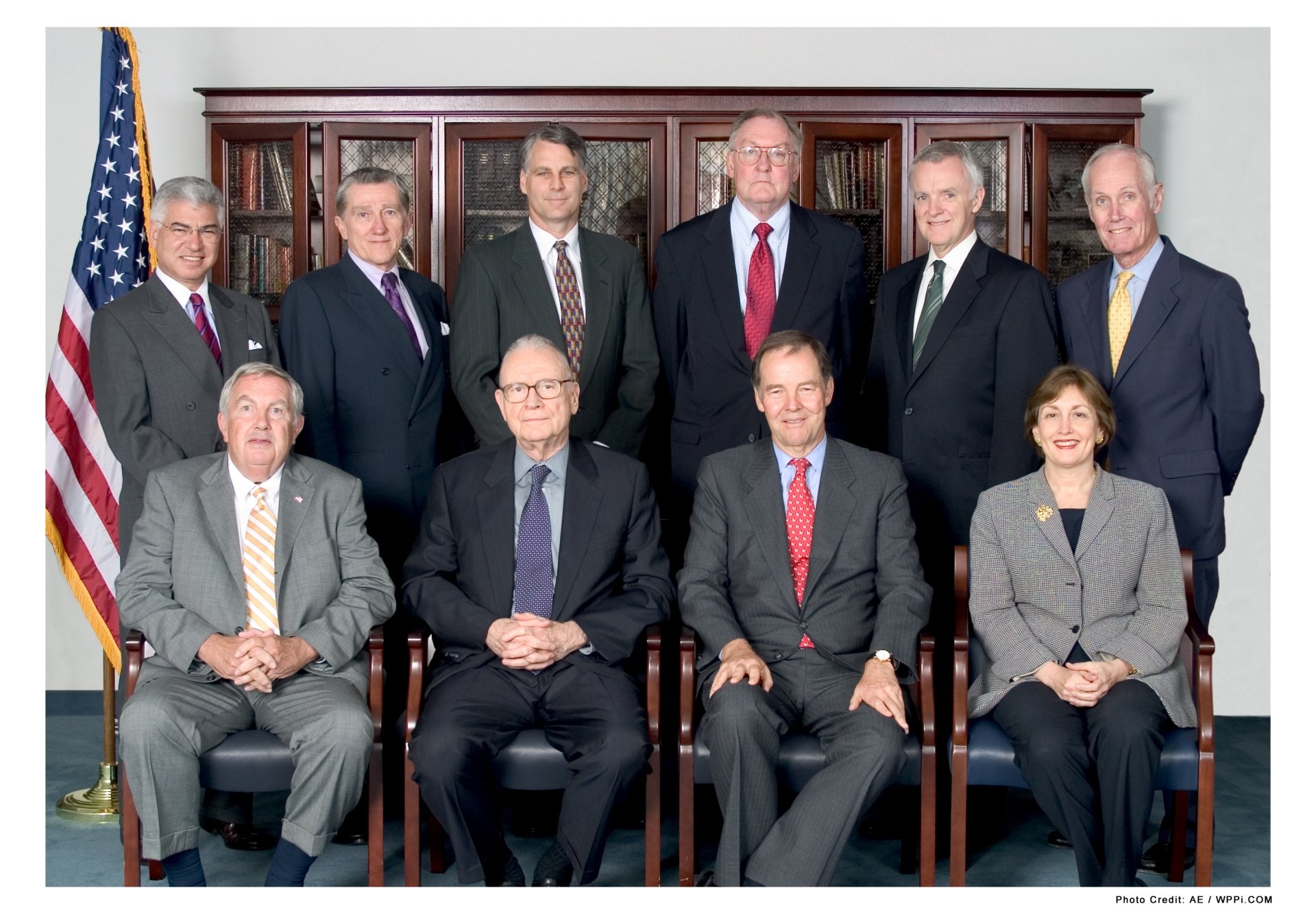
Did you have a daily sense of the pressure that the eyes of the nation, the eyes of the world, were watching your work? Did you have a sense of walking a tightrope to avoid falling into a partisan trap?
HAMILTON: Yes, we knew immediately that the whole country was watching us. You have to remember this event was a serious event in the history of our country and the whole country was interested. With every move Tom and I made, they wanted to know what we were doing and why we were doing it. We also were bird-dogged by several family members who took an enormous interest in every step we took. These are families of the victims, and several of them became very expert. One woman, Tom will know who I’m talking about, didn't know a senator from a congressman or a governor…didn't know a Democrat from a Republican when she started. But, boy oh boy, was she a quick learner. It was the families that were a tremendous help to us. They kept their eye on us, and not only they, but the whole country was watching. This was a searing event in the history of the country and people knew it.
KEAN: The woman Lee was talking about is Mary Fetchet. She and her husband Frank became leaders of VOICES of 9/11, which was the largest of the family organizations. We refer to them, the family organizations, as the wind in our sails. I don't think Lee and I ever between the two of us, and we probably testified in front of Congress at least 40 times minimum, we never appeared before Congress without a member of the families in the audience to back us up every time. They were tough. They didn't let us off the hook. They wanted to make sure we were thorough and we were tough and that we really were going to get the facts out. But when we needed help, whether it was extending the life of the commission or extending the amount of dollars we needed, the families were right there to help us every time.
We refer to them, the family organizations, as the wind in our sails…we never appeared before Congress without a member of the families in the audience to back us up every time. They were tough. They didn't let us off the hook. They wanted to make sure we were thorough and we were tough and that we really were going to get the facts out.
With the benefit of hindsight, we're 20 years out from the attacks and 17 years out from the release of the commission’s report, would you have done anything differently?
KEAN: I don't think so. I mean, I think I’d have to go back to little details and so on. Maybe we’d respond to things a little differently. Lee and I talked every day, almost every day, during that period. And when we weren’t together, we were on the phone, and so we worked out our responses to things, we worked out the decisions we were going to make together, and I can't think of anything. Lee, can you, that we would have done differently in hindsight?
HAMILTON: I cannot. I agree with Tom’s statement.
So then, based on the commission's findings and recommendations, how satisfied are you with how the nation has responded? Not just in the immediate aftermath, but over the passage of time?
HAMILTON: Well look, we made a lot of recommendations. Almost all of them, to my knowledge, were adopted. I think the implementation of those recommendations has been uneven sometimes, for example, particularly in the states. Many of the recommendations required action by the states. Some states responded very positively. I don't know that any responded negatively, but some more positively than others. I was impressed not only with the recommendations made but that we developed follow-through mechanisms that allowed us to see to what extent the recommendations were being adopted. Most of them were clear-cut, and I think positive, and some are just hard to gauge.
We made recommendations regarding foreign policy relationships with Saudi Arabia, and it’s ongoing and complicated and so forth, so you can't just say everything was done according to the recommendations. But by and large, the recommendations were adopted. There was a very big exception. We recommended that the Congress exercise tough oversight but they had to do it by focusing their attention. They had, I don't know, 10 or 12 committees, mucking around in the oversight. None of them with the authority or the jurisdiction really needed to proceed, and we had a difficult time getting the Congress to exercise oversight. To this day I’m not satisfied with the way it's being done, but that was one we just couldn't get our hands around.
We recommended that the Congress exercise tough oversight but they had to do it by focusing their attention. They had, I don't know, 10 or 12 committees, mucking around in the oversight. None of them with the authority or the jurisdiction really needed to proceed, and we had a difficult time getting the Congress to exercise oversight. To this day I’m not satisfied with the way it's being done.
Kean: I remember when we were going over the recommendations. That one came up, making the Congress concentrate and work on one committee. And I think it was Senator Slade Gorton [a member of the commission], who said you'll never get them to do that. And Slade was right. But the rest of them, Lee’s right, they're still ongoing. For instance, I was notified by mail just yesterday that I’m going to be required to have what's called a “Real ID” when I renew my driver’s license. It cannot be duplicated by somebody trying to forge it or something like that. It's taken 20 years, but New Jersey's going to have Real ID, which means the kind of duplications that terrorists and others might try to create won't be possible anymore. So it's still ongoing.
And of course, the thing that we have to be delighted about is that we have not been faced with another major attack, and one of the reasons is that our recommendations were almost entirely implemented. Some of them were very tough to do but they were implemented, or they're still being implemented. The one thing I think I regret a bit, and Lee does too I think, is that this was probably the last major bipartisan thing done in this country. I mean we had unanimous votes on major and tough recommendations in both houses of Congress and by both parties. We hoped this would be a sign that we'd treat things in a more bipartisan manner and that we'd work together more. Of course, the opposite is true. It's something we all regret, I think.
The one thing I think I regret a bit, and Lee does too, I think, is that this was probably the last major bipartisan thing done in this country. I mean we had unanimous votes on major and tough recommendations in both houses of Congress and by both parties. We hoped this would be a sign that we'd treat things in a more bipartisan manner and that we'd work together more. Of course, the opposite is true. It's something we all regret, I think.
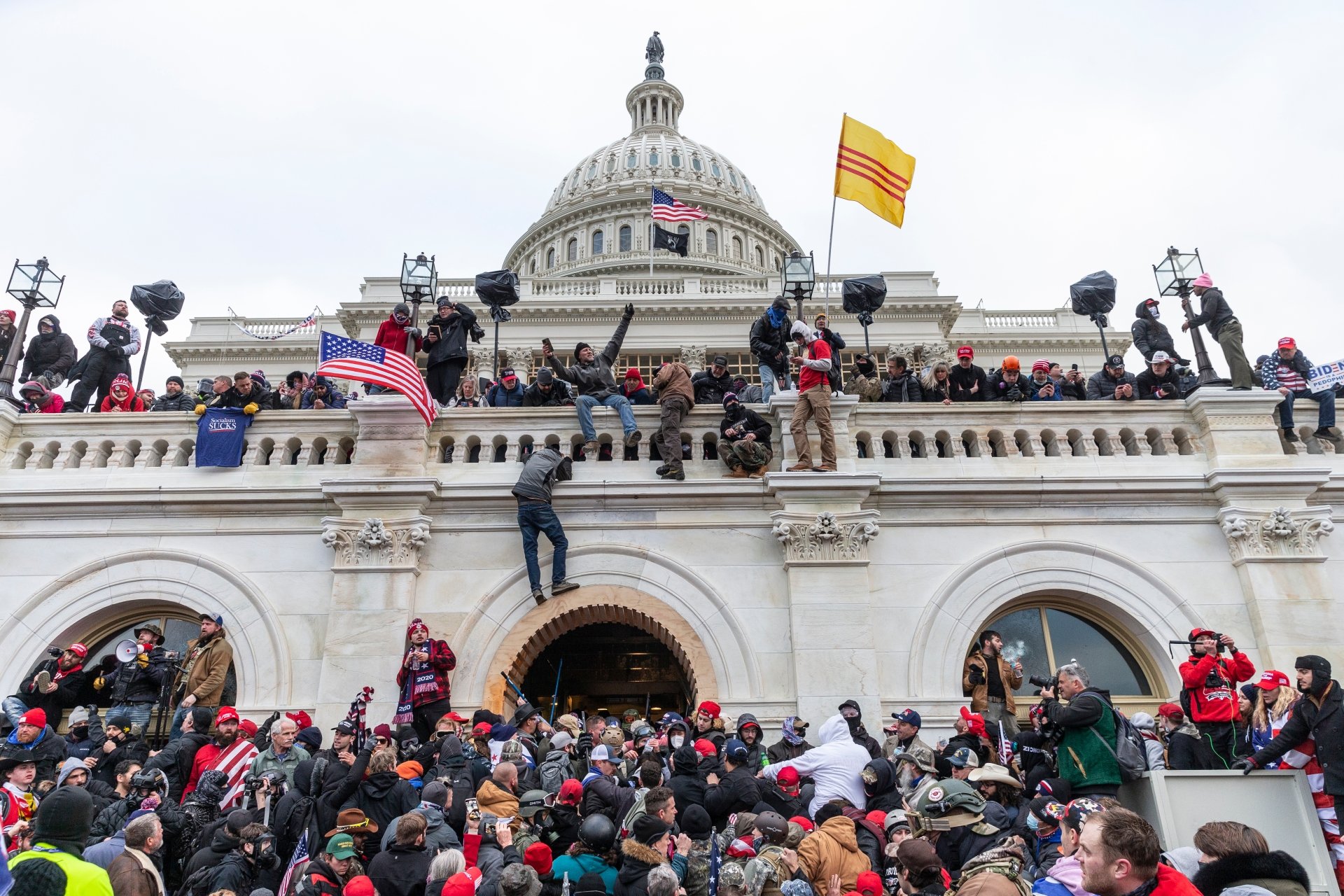
You see it now in the discussions around the January 6 attack on the Capitol and that investigation. Many have invoked the 9/11 Commission as a potential model for what could be done. Do you look at that need for an investigation and think they should have done it your way?
HAMILTON: I do, I certainly do, yes. And the example you give is the prime example of how Congress is botching things at the present time because they're not following the model we had in the Commission. As a result, the investigation into the events of that terrible day is not being pursued as it should. Why did it happen and what do we need to do to prevent it again? Those are the questions Congress ought to be zeroing in on like a beam. They're not doing it.
KEAN: Well Lee’s absolutely right, as usual. And in government, I think you follow what works. It worked. We had a tough job, but five Republicans and five Democrats who didn't know each other before we got together, over a period of time made recommendations that made the country a lot safer and that were accepted in a bipartisan manner. If we'd done something like that in business or in something else, and it worked, we'd figure let's try it again, let's see if we can do the same thing. We haven’t done that at all with January 6.
I think you follow what works. It worked. We had a tough job, but five Republicans and five Democrats who didn't know each other before we got together, over a period of time made recommendations that made the country a lot safer and that were accepted in a bipartisan manner. If we'd done something like that in business or in something else, and it worked, we'd figure let's try it again, let's see if we can do the same thing. We haven’t done that at all with January 6.
But you know, we've also got to look at COVID. We're going to have another pandemic. Everybody knows that. We don't know when it's coming. We don't know what the disease will be, but it's coming. We made a lot of mistakes on this one. Commissions should be looking at it in a bipartisan manner, thinking about how we do it better next time. How do we set up the mechanism now so that when it happens again we never make those same mistakes? There are people looking at it…how the country can reform itself in this area. But do you know what they've come up with? Phil Zeliko, who was our executive director, is very involved in this. They concluded that Congress is incapable, at the moment, of doing that kind of an investigation in a bipartisan manner. So they're moving toward a body which would be nonpartisan but outside of the process. That's sad, I mean it’s sad the Congress cannot do this anymore. It's a sad statement.
They (a study group) concluded that Congress is incapable, at the moment, of doing that kind of an investigation in a bipartisan manner. So they're moving toward a body which would be nonpartisan but outside of the process. That's sad, I mean it’s sad the Congress cannot do this anymore. It's a sad statement.
That must break your heart, Lee…at the Center on Congress [Renamed, the Center on Representative Government]
HAMILTON: Well it really does. One of the things that really stands out to me in our system is that if you're going to get anything done on a long-term sustained basis you have to do it with bipartisan support. You cannot do it with a Democratic program or a Republican program. It may work for a while, but it won't work for the long run. To get anything worthwhile done in this government you've got to work at it a long time and through bipartisanship. We give it a lot of lip service. But the fact of the matter is that it’s essential, and especially needed on national security matters.
To get anything worthwhile done in this government you've got to work at it a long time and through bipartisanship. We give it a lot of lip service. But the fact of the matter is that it’s essential, and especially needed on national security matters.
Gentlemen, I don't expect either of you to leak classified information, but does the world know the full story of 9/11, or are there still surprises to be had when some documents that have not yet to be released are released?
HAMILTON: We insisted that all documents be released unless there was a very clear overriding national security interests and there are some things that fit into that category, but not as many as most people think. But that rule was followed and we released tons of information. That was an instruction from Tom and me that we wanted transparency. If the public gets the idea that a commission or committee is not being transparent they don't like it.
We insisted that all documents be released unless there was a very clear overriding national security interests and there are some things that fit into that category, but not as many as most people think.
KEAN: The conclusion almost all of the commissioners came to, I think all the commissions came to, was that there was too much damn classified information. You came across documents that would have a classified stamp on them and you'd read them and think why in hell is this stuff classified because it's something the public should be aware of.
When we had finished our report, we were asked to try to help declassify more documents. There was this one thing I tried to have declassified, and Lee tried too, and they didn't want to do it. We pointed out that it had been part of public testimony so it was already out there in the public and they put a classified stamp on it. They grumbled a bit said all right we'll look at it. Well, I finally did release it…well as I said, it was already released, but we released it again. But it took six months before they agreed that a document which was already public should be unclassified. That's the kind of ridiculousness we have. I don't know what the answer is but, having not been involved in classified material before, Lee was but, I never was…most of what I read, I’d say 60% of what I read with a classified stamp on it, should have been public and there was no reason whatsoever that the public shouldn't have been aware of those facts.
The conclusion almost all of the commissioners came to, I think all the commissions came to, was that there was too much damn classified information. You came across documents that would have a classified stamp on them and you'd read them and think why in hell is this stuff classified because it's something the public should be aware of.
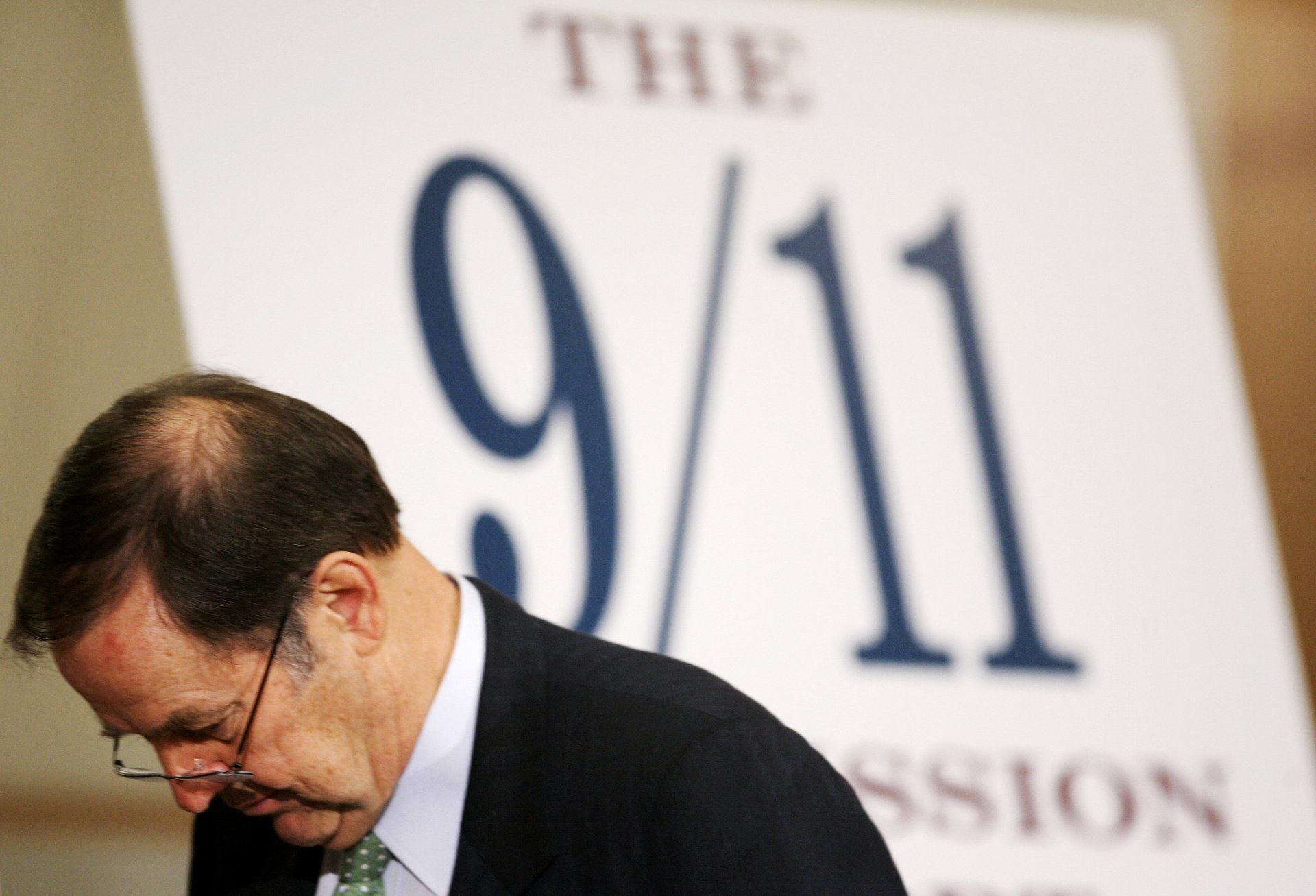
When these types of events happen, whether it's Pearl Harbor or the assassination of JFK…things that are so seismic that people talk about them changing the world…We’ve now had 20 years to look back at 9/11 and sort out what the lasting impact is versus what might have been knee-jerk reactions that really weren't game changers. From your perspectives, how did the events of 9/11 change the world in a lasting way that we're still sorting out today?
HAMILTON: The first thing I would say is the big lesson that emerges is that we need to share information much more broadly than we do. We're doing better, a lot better, than pre 9/11, but I’m not sure we're doing well enough. Transparency is essential to representative democracy, you've got to get that information out. When in doubt put it in the public arena and hold it back very seldom.
I have become very skeptical of people who choose not to make information public, maybe too skeptical, maybe cynical, I don't know. But my experience in government is that the people want to know and they are very, very cynical and suspicious when they think somebody's holding back on them.
Transparency is essential to representative democracy, you've got to get that information out. When in doubt put it in the public arena and hold it back very seldom.
KEAN: Lee’s certainly right on that. It certainly changed the way we live in America. I mean the security now, which is still there, you can't go into an office building in New York or Washington or most other major cities without pulling out all sorts of ID before you can get in the door. We live with greater suspicion. We worry more about our personal and public safety. What's happening in Afghanistan is a tragic tragic end of a story that maybe started on 9/11. The world has changed and I think will continue to change in certain ways because of 9/11. I’m sure that neither our government or any other government ever wants to admit the possibility of a 9/11 happening again.
It certainly changed the way we live in America…We live with greater suspicion. We worry more about our personal and public safety. What's happening in Afghanistan is a tragic end of a story that maybe started on 9/11.
While we've been looking back, obviously we've been thinking about, as you just mentioned Governor Kean, the events in Kabul and throughout Afghanistan. What we’re seeing is heartbreaking and gut-wrenching. It's impossible to ignore it and it's also hard to miss the book-ending of the fact that 9/11 led to the invasion of Afghanistan and now 20 years later it appears that its mission not accomplished. The question that I know you faced time and time and time again is “Are we safer?” In the context of current events and in the context of 20 years of the passage of time, how do you process that question now?
HAMILTON: I think you begin and maybe end with the question of what is the American national interest. That's what you have to focus on now. That's not an easy question to answer, and oftentimes and we certainly don't get everybody's agreement on an answer. But the beginning point is to focus on the right question and that's the right question. What is the national interest of the United States given this set of facts, and zero in on that. That's the starting point.
KEAN: And I think we are safer, and are safer in a large part because of the implementation of the recommendations that the Commission made. Now is it a safer world? I think that's questionable. There are so many trouble spots in the world…the rise of China is a huge factor. That was not there to the extent it is now when we were doing our report. So I don't know if you can say the world is safer, but in terms of an attack coming from people on the other side of the world against the United States, yes, we are safer and we're safer because of the reorganization of intelligence and because of the recommendations we made that the Congress adopted.
There are so many trouble spots in the world…So I don't know if you can say the world is safer, but in terms of an attack coming from people on the other side of the world against the United States, yes we are safer and we're safer because of the reorganization of intelligence and because the of the recommendations we made that the Congress adopted.
Thanks to both of you. Before we let you go, is there anything I haven't asked you that's important to the story or that you'd like to comment on?
KEAN: Well no, except to re-emphasize the idea of bipartisanship and the idea that we would not have been successful unless five Republicans and five Democrats had been willing to come together and forget party on a number of occasions in order to serve the national interest. We've got to get back to those days when people will do that and that's something I worry about every day.
HAMILTON: Tom’s given the right answer. I’ll simply say, I agree.
Authors

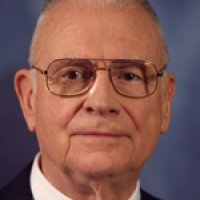
Founder, the Center on Congress at Indiana University; Vice Chair, 9/11 Commission
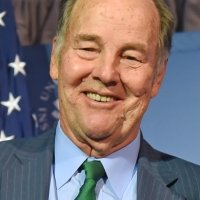
Explore More
Browse Insights & Analysis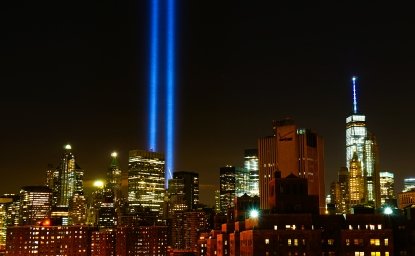
9/11: Twenty Years Since

With Syria’s Collapse Russia’s Regional Power Play Disintegrates

